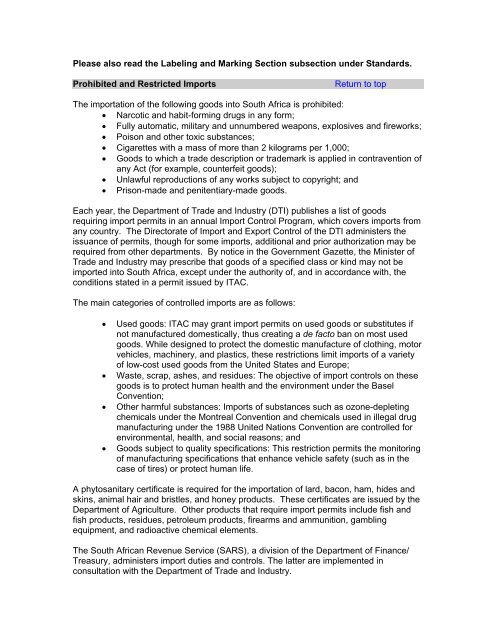South Africa - International Franchise Association
South Africa - International Franchise Association
South Africa - International Franchise Association
Create successful ePaper yourself
Turn your PDF publications into a flip-book with our unique Google optimized e-Paper software.
Please also read the Labeling and Marking Section subsection under Standards.<br />
Prohibited and Restricted Imports Return to top<br />
The importation of the following goods into <strong>South</strong> <strong>Africa</strong> is prohibited:<br />
• Narcotic and habit-forming drugs in any form;<br />
• Fully automatic, military and unnumbered weapons, explosives and fireworks;<br />
• Poison and other toxic substances;<br />
• Cigarettes with a mass of more than 2 kilograms per 1,000;<br />
• Goods to which a trade description or trademark is applied in contravention of<br />
any Act (for example, counterfeit goods);<br />
• Unlawful reproductions of any works subject to copyright; and<br />
• Prison-made and penitentiary-made goods.<br />
Each year, the Department of Trade and Industry (DTI) publishes a list of goods<br />
requiring import permits in an annual Import Control Program, which covers imports from<br />
any country. The Directorate of Import and Export Control of the DTI administers the<br />
issuance of permits, though for some imports, additional and prior authorization may be<br />
required from other departments. By notice in the Government Gazette, the Minister of<br />
Trade and Industry may prescribe that goods of a specified class or kind may not be<br />
imported into <strong>South</strong> <strong>Africa</strong>, except under the authority of, and in accordance with, the<br />
conditions stated in a permit issued by ITAC.<br />
The main categories of controlled imports are as follows:<br />
• Used goods: ITAC may grant import permits on used goods or substitutes if<br />
not manufactured domestically, thus creating a de facto ban on most used<br />
goods. While designed to protect the domestic manufacture of clothing, motor<br />
vehicles, machinery, and plastics, these restrictions limit imports of a variety<br />
of low-cost used goods from the United States and Europe;<br />
• Waste, scrap, ashes, and residues: The objective of import controls on these<br />
goods is to protect human health and the environment under the Basel<br />
Convention;<br />
• Other harmful substances: Imports of substances such as ozone-depleting<br />
chemicals under the Montreal Convention and chemicals used in illegal drug<br />
manufacturing under the 1988 United Nations Convention are controlled for<br />
environmental, health, and social reasons; and<br />
• Goods subject to quality specifications: This restriction permits the monitoring<br />
of manufacturing specifications that enhance vehicle safety (such as in the<br />
case of tires) or protect human life.<br />
A phytosanitary certificate is required for the importation of lard, bacon, ham, hides and<br />
skins, animal hair and bristles, and honey products. These certificates are issued by the<br />
Department of Agriculture. Other products that require import permits include fish and<br />
fish products, residues, petroleum products, firearms and ammunition, gambling<br />
equipment, and radioactive chemical elements.<br />
The <strong>South</strong> <strong>Africa</strong>n Revenue Service (SARS), a division of the Department of Finance/<br />
Treasury, administers import duties and controls. The latter are implemented in<br />
consultation with the Department of Trade and Industry.
















